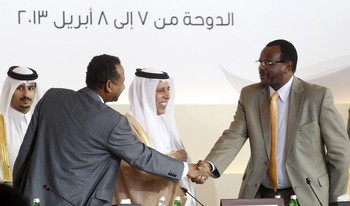Darfur donors conference in Qatar falls short of goal
April 8, 2013 (KHARTOUM) – The International Donor Conference for Reconstruction and Development in Darfur (IDCRDD) which concluded its work Monday in the Qatari capital of Doha fell short of achieving its goal of collecting $ 5.7 billion needed for implementing the development strategy in the war ravaged region.

The final figure however, included $2.65 billion from Sudan’s government per the Doha Document for Peace in Darfur (DDPD) signed in mid-2011. Qatar, the host of the peace talks between the Darfur foes and today’s donor conference, declared that it is making a $500 million contribution.
The other donors included European Union (€27.5 million) ,Germany (€60 million), Britain ($49.5 million) and Darfur’s neighbor Chad ($1 million).
The Sultanate of Oman announced that it will fund the development of the village of Halouf in South Darfur state.
The funds will come in the form of grants, loans, banking facilities, credits and technical assistance. The immediate cash support totaling $177.4 million of which Qatar contributing $88.5 million.
The outcome accounts for barely half of the $7.2 billion target which were to be used over the next six years which comes despite wide participation by regional and international.
A United Nations source, who preferred to remain anonymous, told to the German Press Agency (DPA) that rich nations disappointed by refraining from making meaningful pledges.
“The outcome of the conference is disappointing…..Big and rich countries led by the United States and Japan did not offer anything and contributions from the wealthy Arab states such as Saudi Arabia, Kuwait and the UAE were nominal” the UN official said.
“Raising less than $1 billion reflects absence of political will on the part of the donor countries. There was no significant contribution other than the Qatari’s” the official added.
But Jorg Kuhnel, head of communication of the UN Development Programme (UNDP) in Sudan, told Doha-based Gulf Times that more commitments are expected in the future noting the long term aspect of the strategy.
“The conference doesn’t need to raise the $7.2bn today” Kuhnel said. He went on to say that pledges were enough to start the “foundational and short-term activities” in Darfur.
“What we need to raise is sufficient funds to start implementation and to build credibility of the process. And this we have already achieved at this stage,” the UNDP official said.
The European Development Commissioner Andris Piebalgs said that the EU had serious concerns over the Darfur situation.
“The EU is firmly committed to bringing durable peace to the people of Darfur. However, we remain deeply concerned about the slow implementation of the DDPD, rising insecurity in parts of Darfur and restrictions on access for aid. We hope that all parties to the conflict will take this opportunity to choose political dialogue over armed confrontation”, Piebalgs said.
“We call on the Sudanese government and all parties involved to sustain their efforts to improve the environment in which aid workers operate and fully implement the DDPD to enable a new momentum on development”, he added.
Participants in the IDCRDD agreed that Darfur development strategy should be the basis for gradual shift from a policy based on providing humanitarian aid to supporting development in the region.
The statement pointed out that participating countries and organizations have adopted the strategy as springboard for recovery, reconstruction and development in the Darfur during a six-year period.
A monitoring mechanism characterized by transparency, accountability, competence, and flexibility would be set up to manage the funding necessary to implement the strategy.
The DDPD was signed on 14 July 2011 by the Sudanese government and the Liberation and Justice Movement (LJM) led by al-Tijani al-Sissi. Also on 6 April the peace framework agreement was formally inked by a splinter group from the Justice and Equality Movement led by Mohamed Bashar .
The two factions of the Sudan Liberation Movement of Abdel-Wahid Nur (SLM-AW) and
Minni Minnawi (SLM-MM), and Justice and Equality Movement (JEM) refused to sign the accord and remain at war with Khartoum.
The holdout rebel groups describe the DDPD as “partial solution” and demand a holistic approach for the Sudanese problem. In November 2011, they founded with the Sudan people’s Liberation Movement – North (SPLM-N) an alliance, calling to topple the regime by all means.
This year marks the 10th anniversary of the conflict in Sudan’s troubled western region, where ongoing violence continues to take a terrible human toll.
The United Nations has estimated that around 300,000 people have died during the conflict in Darfur, while some 2 million people have been displaced. Khartoum puts the death toll at 10,000.
(ST)
